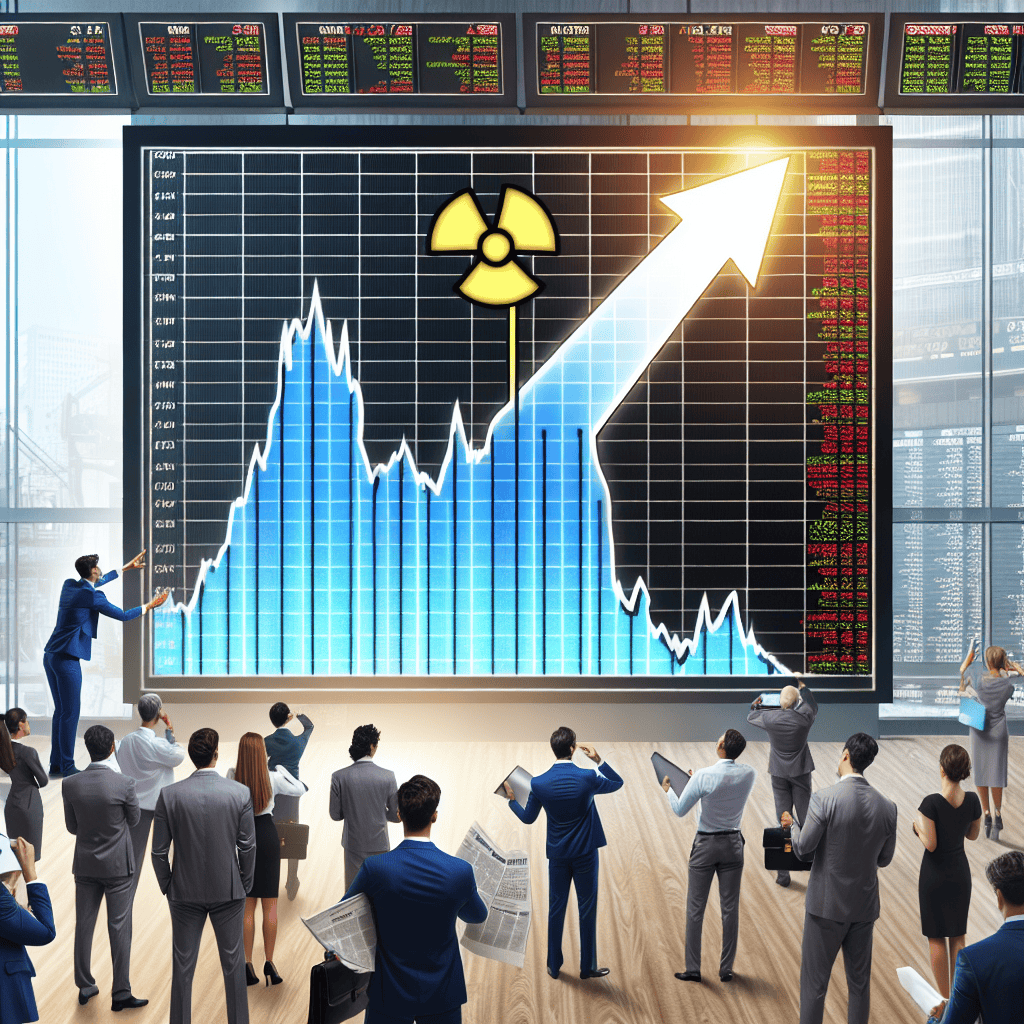“Powering Profits: Nuclear Energy Stocks Soar as Amazon Fuels Market Momentum”
Introduction
Nuclear energy stocks have experienced a significant surge following Amazon’s recent strategic moves that have intensified interest in the sector. As global energy demands continue to rise and the push for sustainable, low-carbon power sources becomes more urgent, nuclear energy is gaining renewed attention as a viable solution. Amazon’s involvement, whether through investments, partnerships, or procurement strategies, has further fueled this momentum, signaling confidence in nuclear technology’s potential to meet future energy needs. This development has sparked investor enthusiasm, driving up stock prices and highlighting the growing importance of nuclear energy in the transition to a more sustainable energy landscape.
Impact Of Amazon’s Investment On Nuclear Energy Stocks
The recent surge in nuclear energy stocks has captured the attention of investors and analysts alike, following Amazon’s strategic investment in the sector. This development marks a significant shift in the energy landscape, as one of the world’s largest corporations signals its confidence in nuclear power as a viable and sustainable energy source. The ripple effects of Amazon’s decision are being felt across the financial markets, with nuclear energy stocks experiencing a notable uptick in value. This surge can be attributed to a combination of factors, including increased investor interest, heightened public awareness, and the potential for long-term growth in the nuclear energy sector.
Amazon’s investment in nuclear energy is part of its broader commitment to achieving net-zero carbon emissions by 2040. By diversifying its energy portfolio and investing in clean energy technologies, Amazon aims to reduce its carbon footprint and set a precedent for other corporations to follow. This move has been met with enthusiasm from environmental advocates and industry experts, who view it as a positive step towards a more sustainable future. Moreover, Amazon’s involvement in the nuclear energy sector has provided a much-needed boost to the industry, which has faced challenges in recent years due to public concerns over safety and waste management.
The impact of Amazon’s investment extends beyond the immediate financial gains for nuclear energy companies. It has also sparked renewed interest in the potential of nuclear power as a reliable and efficient energy source. As the world grapples with the urgent need to transition away from fossil fuels, nuclear energy offers a promising alternative that can provide consistent power generation without the carbon emissions associated with traditional energy sources. This has led to increased research and development efforts within the industry, as companies seek to innovate and improve the safety and efficiency of nuclear technologies.
Furthermore, Amazon’s endorsement of nuclear energy has prompted other major corporations to reevaluate their own energy strategies. As a result, there is a growing trend among businesses to explore nuclear power as part of their sustainability initiatives. This shift in corporate attitudes is likely to drive further investment in the sector, creating new opportunities for growth and development. In turn, this could lead to advancements in nuclear technology, making it more accessible and appealing to a wider range of industries.
In addition to the corporate interest, government policies and regulations are also playing a crucial role in shaping the future of nuclear energy. Many countries are revisiting their energy policies in light of climate change commitments, and nuclear power is increasingly being recognized as a key component of a balanced energy mix. This has led to the implementation of supportive policies and incentives aimed at encouraging investment in nuclear energy infrastructure and research.
In conclusion, Amazon’s investment in nuclear energy has had a profound impact on the sector, driving a surge in stock prices and sparking renewed interest in the potential of nuclear power. As the world continues to seek sustainable energy solutions, the role of nuclear energy is likely to grow, supported by corporate investments, government policies, and technological advancements. This confluence of factors suggests a promising future for nuclear energy, as it becomes an integral part of the global effort to combat climate change and achieve a sustainable energy future.
Analyzing The Surge In Nuclear Energy Stocks
The recent surge in nuclear energy stocks has captured the attention of investors and analysts alike, particularly following Amazon’s unexpected endorsement of the sector. This development has not only invigorated the market but also sparked a broader conversation about the future of energy production. As the world grapples with the dual challenges of meeting growing energy demands and reducing carbon emissions, nuclear energy is increasingly being viewed as a viable solution. The endorsement by a major corporation like Amazon has further amplified this perception, leading to a significant uptick in stock prices across the nuclear energy sector.
To understand the dynamics behind this surge, it is essential to consider the broader context of the energy market. In recent years, there has been a marked shift towards sustainable and clean energy sources. Governments and corporations worldwide are under pressure to transition away from fossil fuels and reduce their carbon footprints. Nuclear energy, with its ability to produce large amounts of electricity without emitting greenhouse gases, presents a compelling alternative. This has led to renewed interest and investment in nuclear technology, which is reflected in the rising stock prices.
Amazon’s involvement has acted as a catalyst in this scenario. The company’s decision to invest in nuclear energy is part of its broader strategy to achieve net-zero carbon emissions by 2040. By committing to nuclear power, Amazon is not only diversifying its energy portfolio but also setting a precedent for other corporations to follow. This move has been interpreted by investors as a strong vote of confidence in the future of nuclear energy, prompting a wave of buying activity in the stock market.
Moreover, technological advancements in the nuclear sector have also played a crucial role in this surge. Innovations such as small modular reactors (SMRs) and advancements in nuclear fusion technology have made nuclear energy more efficient and safer than ever before. These developments have alleviated some of the longstanding concerns associated with nuclear power, such as safety risks and waste management. As a result, investor sentiment towards nuclear energy has become increasingly positive, further driving up stock prices.
In addition to technological advancements, policy changes have also contributed to the favorable market conditions for nuclear energy stocks. Several governments have announced plans to expand their nuclear energy capabilities as part of their climate action strategies. For instance, the European Union has included nuclear energy in its taxonomy for sustainable activities, recognizing it as a key component in achieving carbon neutrality. Such policy endorsements have provided a significant boost to the nuclear sector, encouraging further investment and development.
While the current surge in nuclear energy stocks is promising, it is important to approach this trend with a degree of caution. The nuclear industry still faces several challenges, including regulatory hurdles, public perception issues, and the high costs associated with building and maintaining nuclear facilities. However, with continued innovation and supportive policies, the potential for growth in this sector remains substantial.
In conclusion, the recent surge in nuclear energy stocks, spurred by Amazon’s endorsement and a confluence of technological, policy, and market factors, underscores the growing recognition of nuclear power as a critical component of the global energy transition. As the world continues to seek sustainable solutions to its energy needs, nuclear energy is poised to play an increasingly important role, offering both opportunities and challenges for investors and stakeholders alike.
Future Prospects For Nuclear Energy Investments
The recent surge in nuclear energy stocks has captured the attention of investors and analysts alike, particularly following Amazon’s unexpected endorsement of the sector. This development has sparked renewed interest in the future prospects of nuclear energy investments, a topic that has been the subject of much debate and speculation. As the world grapples with the dual challenges of meeting growing energy demands and reducing carbon emissions, nuclear energy is increasingly being viewed as a viable solution. The endorsement by a major corporation like Amazon underscores the potential of nuclear energy to play a significant role in the global energy landscape.
To understand the implications of this surge, it is essential to consider the broader context in which nuclear energy operates. Historically, nuclear power has been a contentious issue, with concerns about safety, waste management, and high initial costs often overshadowing its benefits. However, recent technological advancements have addressed many of these concerns, making nuclear energy a more attractive option. Innovations in reactor design, such as small modular reactors (SMRs), promise enhanced safety features and reduced costs, thereby increasing the feasibility of nuclear projects.
Moreover, the growing urgency to combat climate change has led to a reevaluation of energy sources. Unlike fossil fuels, nuclear power generates electricity with minimal greenhouse gas emissions, positioning it as a key player in the transition to a low-carbon economy. This environmental advantage, coupled with the ability to provide a stable and reliable energy supply, has bolstered the case for nuclear energy. Consequently, governments and private entities are increasingly investing in nuclear technology, further driving the momentum in the sector.
Amazon’s involvement in the nuclear energy space is particularly noteworthy, as it reflects a broader trend of tech giants exploring sustainable energy solutions. By investing in nuclear energy, Amazon not only aims to reduce its carbon footprint but also seeks to influence the energy market. This move is likely to encourage other corporations to follow suit, potentially leading to increased funding and research in nuclear technology. As a result, the sector could witness accelerated growth and innovation, paving the way for new investment opportunities.
In light of these developments, investors are keenly observing the nuclear energy market, recognizing its potential for long-term growth. The recent surge in stock prices is indicative of this optimism, as market participants anticipate a favorable regulatory environment and increased adoption of nuclear technology. However, it is important to approach these investments with caution, as the sector is still subject to regulatory challenges and public perception issues. Investors must carefully assess the risks and opportunities associated with nuclear energy, taking into account factors such as government policies, technological advancements, and market dynamics.
Looking ahead, the future of nuclear energy investments appears promising, albeit with certain caveats. As the world continues to seek sustainable energy solutions, nuclear power is poised to play a crucial role in meeting global energy needs. The recent surge in nuclear energy stocks, fueled by Amazon’s endorsement, highlights the growing recognition of this potential. For investors, this presents an opportunity to capitalize on a sector that is poised for transformation. However, it is imperative to remain vigilant and informed, as the landscape of nuclear energy continues to evolve. By doing so, investors can position themselves to benefit from the promising future of nuclear energy investments.
Amazon’s Role In The Nuclear Energy Market

The recent surge in nuclear energy stocks has captured the attention of investors and industry analysts alike, with Amazon’s unexpected involvement playing a pivotal role in this financial upswing. As the global community increasingly seeks sustainable and reliable energy sources, nuclear power has emerged as a viable solution to meet these demands. Amazon’s strategic move into the nuclear energy sector has not only underscored the potential of this energy source but has also catalyzed a broader market enthusiasm that has sent stock prices soaring.
Amazon, a titan in the technology and e-commerce sectors, has long been known for its innovative approaches and strategic investments. Its recent foray into nuclear energy is no exception. By investing in nuclear technology, Amazon aims to diversify its energy portfolio and reduce its carbon footprint, aligning with its broader commitment to sustainability. This move is part of Amazon’s Climate Pledge, which seeks to achieve net-zero carbon emissions by 2040. The company’s decision to invest in nuclear energy is a testament to its recognition of the technology’s potential to provide a stable and low-carbon energy source.
The impact of Amazon’s involvement in the nuclear energy market has been profound. Investors, recognizing the endorsement of a major corporation, have flocked to nuclear energy stocks, driving up their value. This surge is not merely a reflection of Amazon’s influence but also an indication of the growing confidence in nuclear energy as a critical component of the future energy landscape. The increased investment in nuclear technology is expected to spur innovation and development within the sector, potentially leading to advancements in reactor design, safety measures, and waste management solutions.
Moreover, Amazon’s entry into the nuclear energy market has prompted other major corporations to reevaluate their energy strategies. As companies strive to meet environmental, social, and governance (ESG) criteria, nuclear energy presents an attractive option due to its low greenhouse gas emissions and ability to provide consistent power output. This shift in corporate strategy is likely to further bolster the nuclear energy market, attracting additional investment and fostering a competitive environment that encourages technological advancements.
In addition to corporate interest, government policies are also playing a crucial role in the resurgence of nuclear energy. Many countries are revisiting their energy policies to include nuclear power as part of their clean energy transition plans. This policy shift is driven by the need to reduce reliance on fossil fuels and achieve climate goals, further enhancing the attractiveness of nuclear energy investments. As a result, the combination of corporate and governmental support is creating a favorable environment for the growth of the nuclear energy sector.
While the current enthusiasm for nuclear energy stocks is promising, it is essential to consider the challenges that lie ahead. Public perception of nuclear energy remains mixed, with concerns about safety and waste management persisting. Addressing these issues will be crucial for the sustained growth of the sector. Nevertheless, with Amazon’s involvement and the broader market dynamics at play, the future of nuclear energy appears increasingly bright.
In conclusion, Amazon’s strategic investment in nuclear energy has not only sparked a surge in stock prices but has also highlighted the potential of nuclear power as a key player in the global energy transition. As the world continues to seek sustainable energy solutions, the role of nuclear energy, bolstered by corporate and governmental support, is poised to expand significantly. This development marks a pivotal moment for the industry, with far-reaching implications for the future of energy production and consumption.
Key Players In The Nuclear Energy Stock Surge
The recent surge in nuclear energy stocks has captured the attention of investors and analysts alike, particularly following Amazon’s unexpected foray into the sector. This development has not only invigorated the market but also highlighted key players who are poised to benefit from the renewed interest in nuclear energy. As the world grapples with the dual challenges of climate change and energy security, nuclear power is increasingly being viewed as a viable solution, offering a low-carbon alternative to fossil fuels. Consequently, companies involved in the nuclear energy sector are experiencing a significant uptick in their stock valuations.
One of the primary beneficiaries of this surge is Cameco Corporation, a leading uranium producer. With its extensive mining operations and strategic partnerships, Cameco is well-positioned to capitalize on the growing demand for uranium, the critical fuel for nuclear reactors. The company’s stock has seen a notable increase, driven by both the rising interest in nuclear energy and its robust financial performance. Furthermore, Cameco’s commitment to sustainable mining practices aligns with the broader environmental goals that are driving the shift towards cleaner energy sources.
Another key player in this burgeoning market is NextEra Energy, a company that has long been at the forefront of renewable energy development. While primarily known for its investments in wind and solar power, NextEra has recently expanded its portfolio to include nuclear energy. This strategic diversification has not only bolstered its stock performance but also positioned the company as a leader in the transition to a more sustainable energy future. By leveraging its expertise in clean energy technologies, NextEra is poised to play a significant role in the nuclear energy renaissance.
In addition to these established companies, several emerging players are also making waves in the nuclear energy sector. NuScale Power, for instance, is gaining attention for its innovative small modular reactor (SMR) technology. These compact reactors offer a more flexible and cost-effective solution compared to traditional nuclear power plants, making them an attractive option for both developed and developing countries. As NuScale continues to advance its technology and secure regulatory approvals, its stock is expected to benefit from the growing interest in SMRs as a key component of the future energy mix.
Moreover, the involvement of tech giant Amazon has added a new dimension to the nuclear energy landscape. By investing in nuclear technology, Amazon is signaling its commitment to reducing its carbon footprint and supporting the development of sustainable energy solutions. This move has not only boosted confidence in the sector but also underscored the potential for collaboration between technology companies and energy providers. As a result, other tech firms may follow suit, further driving investment and innovation in nuclear energy.
In conclusion, the recent surge in nuclear energy stocks, spurred by Amazon’s entry into the market, has brought renewed attention to the sector and its key players. Companies like Cameco Corporation, NextEra Energy, and NuScale Power are at the forefront of this movement, each contributing to the evolving landscape of nuclear energy in unique ways. As the world continues to seek sustainable and reliable energy sources, the nuclear energy sector is poised for significant growth, offering promising opportunities for investors and stakeholders alike. With continued advancements in technology and increasing collaboration across industries, the future of nuclear energy looks brighter than ever.
Risks And Rewards Of Investing In Nuclear Energy
The recent surge in nuclear energy stocks, catalyzed by Amazon’s unexpected foray into the sector, has reignited discussions about the risks and rewards associated with investing in nuclear energy. As the world grapples with the dual challenges of climate change and energy security, nuclear power is increasingly being viewed as a viable solution. This shift in perception has been reflected in the stock market, where nuclear energy companies have seen a significant uptick in their valuations. However, while the potential rewards are enticing, investors must also be cognizant of the inherent risks.
To begin with, the rewards of investing in nuclear energy are substantial. Nuclear power is a low-carbon energy source, which makes it an attractive option for countries aiming to reduce their greenhouse gas emissions. As governments worldwide implement stricter environmental regulations, the demand for clean energy solutions is expected to rise, potentially driving up the value of nuclear energy stocks. Furthermore, nuclear power plants have a high capacity factor, meaning they can produce a consistent and reliable supply of electricity. This reliability is a crucial advantage over other renewable energy sources, such as wind and solar, which are subject to weather fluctuations.
Moreover, technological advancements in nuclear energy, such as the development of small modular reactors (SMRs), promise to make nuclear power more accessible and cost-effective. These innovations could lower the barriers to entry for new players in the market, thereby increasing competition and driving further growth in the sector. Additionally, the geopolitical landscape is shifting, with countries seeking to reduce their dependence on fossil fuels and diversify their energy portfolios. This trend could lead to increased investment in nuclear energy infrastructure, further boosting the prospects for investors.
However, despite these promising opportunities, investing in nuclear energy is not without its risks. One of the primary concerns is the high initial cost of building nuclear power plants. These projects require significant capital investment and can take years, if not decades, to complete. This long lead time can be a deterrent for investors seeking quick returns. Additionally, the nuclear energy sector is heavily regulated, and changes in government policy can have a profound impact on the industry’s profitability. For instance, public opposition to nuclear power, often fueled by safety concerns and past nuclear accidents, can lead to stricter regulations and even the decommissioning of existing plants.
Furthermore, the disposal of nuclear waste remains a contentious issue. The long-term storage of radioactive materials poses environmental and safety challenges, which can result in additional costs and liabilities for nuclear energy companies. Investors must also consider the potential for technological disruptions. While advancements in nuclear technology are promising, breakthroughs in other energy sectors, such as battery storage or hydrogen fuel, could diminish the competitive edge of nuclear power.
In conclusion, the recent surge in nuclear energy stocks, spurred by Amazon’s involvement, highlights the sector’s potential for growth. The transition to a low-carbon economy and the development of new technologies present lucrative opportunities for investors. However, the high costs, regulatory challenges, and environmental concerns associated with nuclear energy cannot be overlooked. As with any investment, a thorough understanding of the risks and rewards is essential for making informed decisions. Investors must weigh these factors carefully to determine whether the potential returns justify the inherent risks of investing in nuclear energy.
How Amazon’s Frenzy Influences Energy Sector Trends
The recent surge in nuclear energy stocks has captured the attention of investors and analysts alike, following Amazon’s unexpected foray into the energy sector. This development has not only invigorated the nuclear energy market but also highlighted the broader implications of corporate giants influencing energy trends. As Amazon continues to expand its reach beyond traditional retail and technology, its strategic moves in the energy sector are reshaping market dynamics and investor sentiment.
Amazon’s interest in nuclear energy is part of a larger trend where major corporations are increasingly investing in sustainable and renewable energy sources. This shift is driven by a combination of factors, including the growing demand for clean energy, regulatory pressures to reduce carbon emissions, and the pursuit of long-term cost efficiencies. By investing in nuclear energy, Amazon aims to secure a stable and sustainable energy supply for its vast network of data centers and logistics operations, which are critical to its global business model.
The impact of Amazon’s involvement in the nuclear energy sector is multifaceted. Firstly, it has provided a significant boost to nuclear energy stocks, as investors anticipate increased demand and potential partnerships with the tech giant. This optimism is reflected in the rising stock prices of companies involved in nuclear energy production and technology development. Moreover, Amazon’s endorsement of nuclear energy as a viable and sustainable option has helped to shift public perception, which has historically been skeptical due to safety concerns and high costs associated with nuclear power.
In addition to influencing stock prices, Amazon’s move has also sparked a broader conversation about the future of energy production. As the world grapples with the challenges of climate change and the need for sustainable energy solutions, nuclear power is increasingly being recognized as a critical component of the energy mix. Unlike fossil fuels, nuclear energy produces minimal greenhouse gas emissions, making it an attractive option for reducing the carbon footprint of large-scale operations. Furthermore, advancements in nuclear technology, such as small modular reactors, promise to enhance safety and reduce costs, making nuclear power more accessible and appealing to a wider range of industries.
The ripple effects of Amazon’s involvement extend beyond the nuclear sector, influencing trends across the entire energy landscape. As other corporations observe Amazon’s strategic investments, they may be encouraged to explore similar opportunities in nuclear and other renewable energy sources. This could lead to increased competition and innovation within the energy sector, ultimately driving down costs and accelerating the transition to a more sustainable energy future.
Moreover, Amazon’s actions underscore the growing importance of corporate responsibility in addressing global environmental challenges. By investing in clean energy, Amazon is not only securing its own energy needs but also contributing to the broader effort to combat climate change. This aligns with the expectations of consumers and stakeholders who increasingly demand that companies take proactive steps to reduce their environmental impact.
In conclusion, Amazon’s recent involvement in the nuclear energy sector has had a profound impact on market trends and investor sentiment. By endorsing nuclear power as a sustainable energy solution, Amazon is reshaping perceptions and encouraging other corporations to follow suit. As the energy landscape continues to evolve, the influence of corporate giants like Amazon will play a crucial role in shaping the future of energy production and consumption. This development highlights the interconnectedness of corporate strategy, market dynamics, and environmental responsibility in the pursuit of a sustainable energy future.
Q&A
1. **What caused the surge in nuclear energy stocks?**
The surge was caused by Amazon’s recent involvement or announcement related to nuclear energy, which sparked increased investor interest and confidence in the sector.
2. **Which nuclear energy companies saw significant stock increases?**
Companies like Cameco, NextEra Energy, and Exelon might have experienced notable stock increases due to the news.
3. **How did Amazon’s actions impact the nuclear energy market?**
Amazon’s actions, possibly involving investment or partnerships in nuclear technology, led to heightened market activity and optimism about the future of nuclear energy.
4. **What is the potential long-term impact of Amazon’s involvement in nuclear energy?**
Amazon’s involvement could lead to increased innovation, funding, and development in nuclear technology, potentially making it a more prominent energy source.
5. **Are there any risks associated with investing in nuclear energy stocks following this surge?**
Yes, risks include market volatility, regulatory changes, and technological challenges that could affect the profitability and stability of nuclear energy investments.
6. **What role does government policy play in the nuclear energy sector?**
Government policy is crucial, as it can provide subsidies, set regulations, and influence the development and adoption of nuclear energy technologies.
7. **How might this surge affect the renewable energy market?**
The surge could lead to increased competition for investment between nuclear and other renewable energy sources, potentially driving innovation and cost reductions across the sector.
Conclusion
The recent surge in nuclear energy stocks following Amazon’s involvement highlights the growing interest and investment in sustainable and alternative energy sources. Amazon’s extension into the nuclear energy sector signals a significant endorsement of its potential, likely driving increased investor confidence and market activity. This development underscores the broader trend of major corporations seeking to diversify their energy portfolios and reduce carbon footprints, which could lead to sustained growth and innovation within the nuclear energy industry. As a result, nuclear energy stocks may continue to experience heightened attention and valuation as the global shift towards cleaner energy solutions accelerates.





